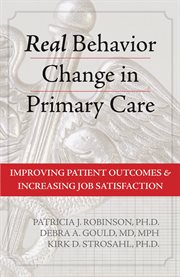Nonfiction
eBook
Details
PUBLISHED
Made available through hoopla
DESCRIPTION
1 online resource
ISBN/ISSN
LANGUAGE
NOTES
A Toolkit for Creating Lasting Behavior Change in Your Patients. As a primary care provider, you are on the front lines of medical treatment. Oftentimes, you're the first medical professional patients come to when they experience problems with their health. While some of these problems can be resolved by traditional medical treatment, many others are driven by underlying psychological issues and unhealthy lifestyle choices that you may feel powerless to affect. Between repeat patient visits and the frustrating progression of preventable symptoms and conditions, it's no wonder so many medical and behavioral health providers feel burned out and at a loss for effective solutions. This guide was designed to help you find those solutions and recapture the ability to effectively help patients achieve optimal health and happiness. Real Behavior Change in Primary Care offers ten-minute interventions that provide your patients with the tools they need to change unworkable and unhealthy behaviors. Each short yet powerful intervention utilizes empirically supported skills from acceptance and commitment therapy (ACT), a form of cognitive behavioral therapy, to help you empower patients to take charge of the psychological blocks that keep them from resolving their health problems. You'll also apply ACT skills to your own life and learn to better manage stress, recover from burnout, and rediscover the meaning behind your work as a health care provider. Help patients suffering with: Chronic disease. Alcohol and substance abuse. Chronic pain. Anxiety and depression. Trauma and abuse. Real Behavior Change in Primary Care offers primary care providers effective protocols for using acceptance and commitment therapy (ACT) with difficult and 'untreatable' patients to facilitate lasting behavior change
Mode of access: World Wide Web







